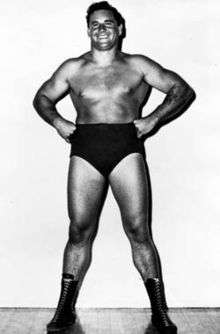Johnny Barend
| Johnny Barend | |
|---|---|
 | |
| Birth name | John R. Barend |
| Born |
March 27, 1929[1] Rochester, New York, U.S.[1] |
| Died |
September 20, 2011 (aged 82)[1] Avon, New York, U.S. |
| Spouse(s) |
Annie Lum (m. 1967; his death 2011) |
| Professional wrestling career | |
| Ring name(s) |
Handsome Johnny Johnny Barend[1] |
| Billed height | 6 ft 1 in (1.85 m)[1] |
| Billed weight | 230 lb (100 kg)[1] |
| Trained by | Ed Don George[1] |
| Debut | November 1, 1949[1] |
| Retired | 1972 |
John R. Barend (March 27, 1929 – September 20, 2011),[1] better known as "Handsome" Johnny Barend, was an American professional wrestler.
Early career
Born in 1929 in Rochester, New York, Barend started wrestling as an amateur at the age of eight. After graduating from Jefferson High School in Rochester in 1944, he served in the United States Navy during World War II and wrestled while in the service.
Career
He was trained to wrestle professionally by Ed Don George and made his professional debut on November 1, 1948.
Soon after, he started teaming with Gene Dubuque, who was wrestling under the name, Magnificent Maurice. Barend usually played the part of the "heel" or bad guy. He would enter the ring wearing his customary hat and sunglasses an unlit cigar gracing his lips and would goad fans with his soliloquies. Barend's original manager was Ernie Roth, then using the name Mr. Kleen. Roth would later gain fame in the WWWF as the Grand Wizard of Wrestling. Barend and Maurice went on to win many tag-team championships. Barend first appeared in Hawaii with 50th State Big Time Wrestling in September 1955.
In 1962–1963, Barend was a regular tag team partner with NWA/WWWF world champion Buddy Rogers, and they held the U.S. tag team championship. Their manager was Bobby Davis. Barend won a variety of titles in his career spent mostly on the east coast in and around New York or in Hawaii where he enjoyed his greatest success. Barend would hold the NWA Hawaii Tag Team Championship a number of times with a variety of partners as well as the San Francisco version of the NWA World Tag Team Championship.
During his time in Hawaii he came up with the phrase, "Win if you can, lose if you must, but always cheat" which was later "borrowed" by Jesse Ventura. Barend would hold the NWA United States Tag Team Championship with former foe Buddy Rogers in mid-1962. Barend won a variety of titles in his career spent mostly on the east coast in and around New York or in Hawaii where he enjoyed his greatest success. Barend would hold the NWA Hawaii Tag Team Championship a number of times with a variety of partners as well as the San Francisco version of the NWA World Tag Team Championship. Barend would even hold the NWA United States Tag Team Championship with former foe Buddy Rogers from mid-1962 until Spring 1963. After Rogers lost the WWWF title to Bruno Sammartino, in summer 1963 Rogers and Barend defeated Sammartino and Bobo Brazil in Madison Square Garden, 2 falls to 1. He wrestled Dory Funk, Jr. in 1969 for the NWA World Heavyweight Championship. He retired from wrestling in 1972.
Marriage
Barend married Annie Lum in 1967 in Honolulu, Hawaii.
Death
Barend died on September 20, 2011 in Avon, New York. He reportedly died peacefully in his sleep from natural causes after refusing a visit to the hospital as suggested by his doctor.
Championships and accomplishments
- 50th State Big Time Wrestling
- NWA Hawaii Heavyweight Championship (2 times)
- NWA North American Heavyweight Championship (Hawaii version) (2 times)
- NWA Hawaii Tag Team Championship (7 times) – with Sandor Kovacs (1), Ripper Collins (2), Hans Mortier (1), Jim Hady (1), Magnificent Maurice (1), and Billy Robinson (1)
- NWA United States Heavyweight Championship (Hawaii version) (1 time)
- American Wrestling Alliance (Indiana)
- AWA Indiana World Tag Team Championship (1 time) – with Magnificent Maurice
- Capitol Wrestling Corporation/World Wide Wrestling Federation
- Midwest Wrestling Association (Ohio)
- MWA Ohio Heavyweight Championship (1 time)
- MWA Ohio Eastern States Heavyweight Championship (2 times)
- MWA Ohio Tag Team Championship (1 time) – with Magnificent Maurice
- NWA Detroit
- NWA World Tag Team Championship (Detroit version) (1 time) – with Magnificent Maurice
- NWA Hollywood Wrestling
- WWA International Television Tag Team Championship (1 time) - with Bill Melby
- NWA San Francisco
References
Further reading
- Hornbaker, Tim. Legends of Pro Wrestling: 150 Years of Headlocks, Body Slams, and Piledrivers. New York: Skyhorse Publishing Inc., 2012. ISBN 978-1-61321-075-8
External links
- Oliver, Greg (August 21, 2008). "SLAM! Wrestling: A visit with 'Handsome' Johnny Barend". Canoe.ca. Retrieved December 14, 2012.
- Oliver, Greg (September 21, 2011). "SLAM! Wrestling: Goodbye to "Handsome" Johnny Barend". Canoe.ca. Retrieved December 14, 2012.
- Pang, Gordon Y.K. (September 20, 2011). "Wrestler 'Handsome' Johnny Barend dies in New York". Honolulu Star-Advertiser. Retrieved December 9, 2012.